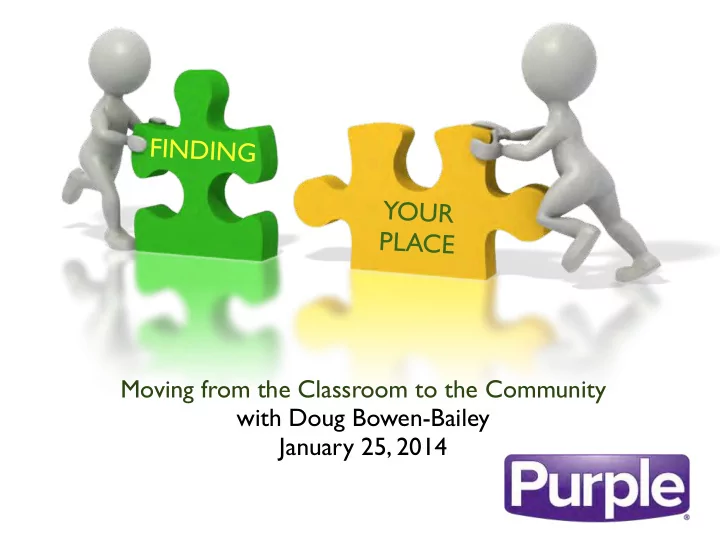

FINDING YOUR PLACE Moving from the Classroom to the Community with Doug Bowen-Bailey January 25, 2014
Introductions • Name • Work Setting • Experience in community & educational settings • One item unrelated to your work
Rules of the Road • Guidelines for interaction for the day. • What agreement will help this day be successful for you?
Classroom Community
So I’m here... • A little about me • A little about you • What did you learn? • What questions do you have?
Changing Paradigms Focus on Interpreter’s Actions Focus on Consequences for Participants Witter-Merithew, Nicodemus, & Johnson
Antagonistic Autonomy Interpreters vs. the System Why can’t they understand how great interpreters are?
Functional Autonomy
Relational Autonomy
Identify Constellation of Demands Concurrent Concurrent Demand Demand Main Demand Concurrent Concurrent Demand Demand Environmental Concurrent Interpersonal Demand Paralingual Intrapersonal
• Dialogic Work Analysis Pre-Assignment During Assignment Post-Assignment Control Demand Consequence Resulting....
Continuum of Ethical Behavior Graphic and concept developed by Robyn Dean & Robert Pollard
Role-Space • from Robert Lee & Peter Llewellyn-Jones Axis of Interaction Management High Axis of Presentation of Self High Axis of Participant Alignment Hearing Deaf Low Low
Role-Space Axis of Interaction Management High Liberal Axis of Presentation of Self Liberal High Axis of Participant Alignment Conservative Hearing Deaf Liberal Liberal Conservative Low Low Conservative
Power Dynamics
The Work of Justice
T echniques for Reflective Practice • Journal • Dialogue with colleagues • Dialogue with consumers • Use a model of reflection • from Anna Witter-Merithew “Breaking Down Silos through Reflective Practice” 2012 and Fink, 2013.
Bare Bones of Reflective Practice • What? • So what? • Now what? • from Anna Witter-Merithew “Breaking Down Silos through Reflective Practice” 2012 and Fink, 2013.
Bare Bones of Reflective Practice • What? (F) Facts • So what? (Q) Questions • Now what? (E) Evaluation • from Anna Witter-Merithew “Breaking Down Silos through Reflective Practice” 2012 and Fink, 2013. • FQE from a participant in a workshop on Case Conferencing
Co-Mentoring Professional relationship • Hold each other accountable for professional development • Opportunity for reflective practice • Classroom & community connection From Debra Russelll & Karen Malcolm at Critical Link International
Principles for Case Conferencing • Be accountable - Use a framework/model • Keep priority on consequences for participants in interpreted interactions • Describe case in non-evaluative manner It is what it is. • Use discretion in sharing identifying information
Let’s Try It
The Old Paradigm • http://youtu.be/HcHtjFn44yM
The Emerging Paradigm • Handout of case (Blend of classroom and community)
Recommend
More recommend